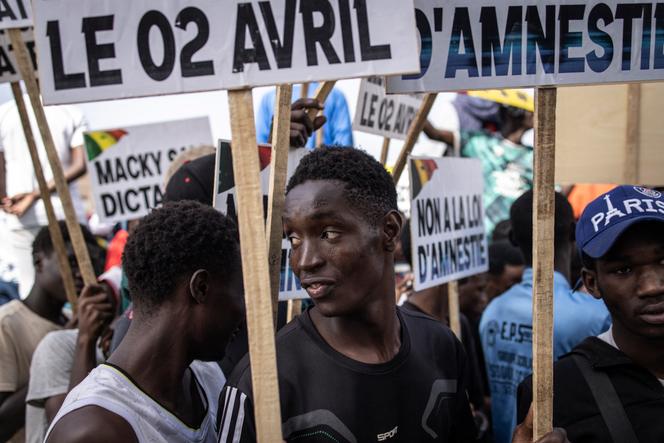


Will Ousmane Sonko, the opposition politician imprisoned since July 2023, poised to become the first recipient of Senegal's amnesty law? The path is now cleared for his release, as well as that of his substitute in the presidential election, Bassirou Diomaye Faye, according to the legislation presented by the government to MPs on Monday, March 4. Adopted by the Council of Ministers on Wednesday, February 28, this measure, urged by President Macky Sall "to pacify the political arena," must now undergo an expedited passage in the National Assembly.
The text, examined by the Law Commission, will be followed by a plenary vote on Wednesday. If it is adopted, will it be the antidote to the political crisis triggered a month ago by the head of state's decision to postpone the presidential election, without a polling date having been set since then? The ensuing controversy and resulting uncertainties in Senegal's current state of flux warrant caution.
The first article of the draft text states that the amnesty pertains to "all acts that may be classified as a criminal or correctional offense committed between February 1, 2021, and February 25, 2024, both in Senegal and abroad, relating to demonstrations or having political motivations, including those made by any communication media, whether or not the perpetrators have been tried."
Although no names were mentioned, the legislation hints at the potential release of Faye, the official candidate of the now-disbanded party, the Patriotes Africains du Sénégal pour le Travail, l'Ethique et la Fraternité (PASTEF). Arrested in April 2023, notably for "contempt of court," he remains detained for "acts likely to compromise public peace." In its second article, the bill seems to go even further, specifying that "this amnesty entails, without giving rise to restitution, the total remission of all principal, accessory and complementary penalties, as well as the disappearance of all disqualifications, exclusions, incapacities, and deprivations of rights attached to the penalty."
These lines should spark debate on the potential release, or even the candidacy, of Sonko, who is being held with conspiracy against the state and calls for insurrections. The staunchest opponent of Sall was rendered ineligible by his suspended six-month prison sentence for defamation of the Minister of Tourism, Mame Mbaye Niang.
Citing the rationale outlined at the beginning of the bill, which aims to "restore the civil and political rights of individuals who have been deprived of them," opposition lawyer Etienne Dionne contends that his client is eligible for amnesty because "this is a case between two political actors, concerning remarks made by Mr. Sonko during a political activity."
However, there is another conviction hanging over Sonko's prison and political future that would not be covered by the bill: a two-year prison sentence for "corruption of youth," after the PASTEF leader was accused of repeated rape by an employee of a massage parlor in Dakar.
Given the stakes involved, discussions at the National Assembly are expected to be long and contentious, even though the text is not unanimously supported by either the majority or the opposition. Ismaïla Madior Fall, current Minister of Foreign Affairs and former justice minister, asserted on February 27, during an appearance on the private television channel 7TV, that the amnesty would not cover either defamation or the rape case in which Sonko was convicted. No other official position has since been expressed.
Cautious, the Senegalese Democratic Party said it wants to "study the content" before issuing a statement, while Karim Wade, the son of former president Abdoulaye Wade, is attempting to re-enter the presidential race after his candidacy was rejected on the grounds of dual nationality.
"The law is vague, and we're going to seek expert advice before presenting a unified stance," explained Ayib Daffé, MP for the former PASTEF party. If the amnesty were to result in the release of PASTEF's two main leaders, it could prompt internal discussions regarding whether to hold an early election with Faye, which has been called for so far, or a later one with Sonko, its main leader.
President Sall maintains his pledge to step down on April 2 at the end of his term but seizes every opportunity to sow confusion among his opponents in the meantime.
"We are not asking for this amnesty. We want the truth first, and for the guilty parties to be judged before we can forgive," said Abdoulaye Wade (no relation to the former president), who has been fighting for three years "for light to be shed" on the death of his brother in March 2021 during a protest. He has filed a complaint against the police commander in the Parcelles Assainies district of Dakar, where the young man was killed.
"It's premature to pass this law; we've witnessed around 50 deaths since the March 2021 protests, and not a single person has been held accountable. We can't erase everything," said Seck, president of the Senegalese Human Rights League. For Seydi Gassama, director of the Senegalese section of Amnesty International, this law represents "a denial of justice for the victims of police brutality," and "a rewards impunity" for all those responsible.
Translation of an original article published in French on lemonde.fr; the publisher may only be liable for the French version.
